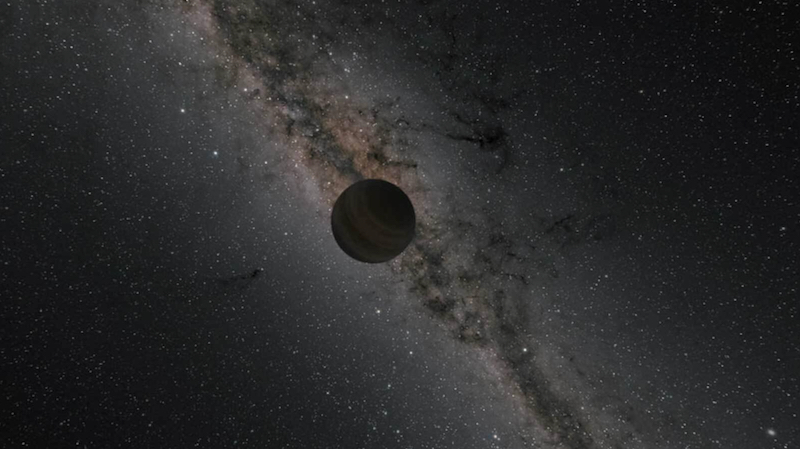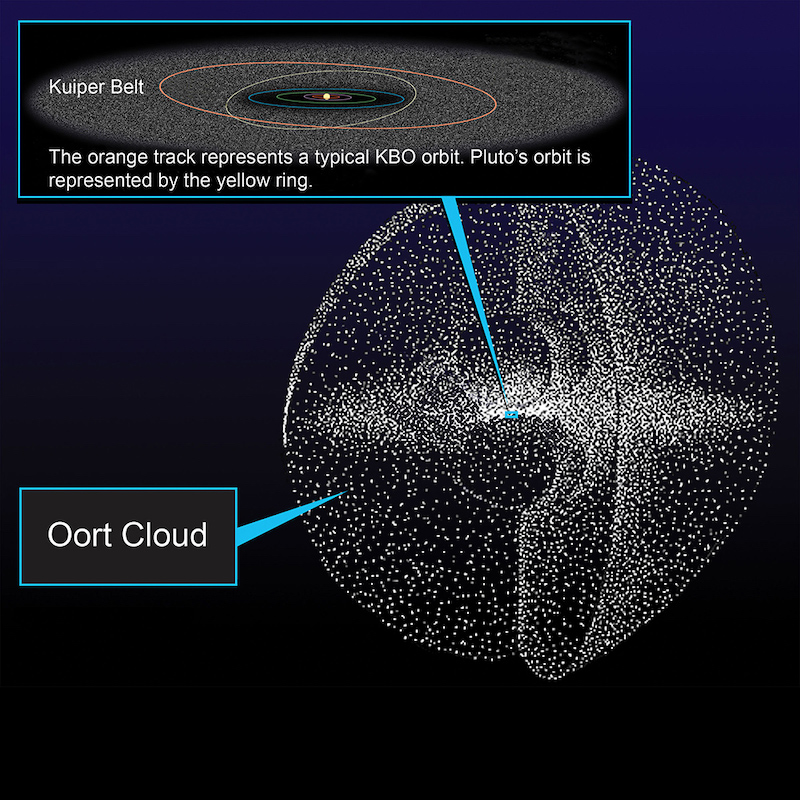
The Oort Cloud is a vast region in the far outer solar system composed of billions of comets and other icy objects. Most of this icy debris is quite small, but could there be something lurking there, like … a planet? Last month, an international team of researchers said that’s indeed a possibility. They contend that there’s a small chance a wayward planet in our own early solar system ended up in the Oort Cloud. And a slightly higher chance that it was a rogue exoplanet, most likely an ice giant around the size of Neptune. It could have come to rest in the Oort Cloud after being drawn in by the sun’s gravity.
Brian Koberlein wrote about this intriguing possibility for Universe Today on June 24, 2023.
The researchers’ new paper hasn’t been peer-reviewed yet, but it has been submitted to the Monthly Notices of the Royal Astronomy Society. You can read a preprint version on arXiv, posted on June 21, 2023.
From one solar system to another
The main premise is that a planet could be ejected from one young solar system and then captured by another solar system. Is that possible? The researchers ran some computer calculations to try to find the answer. They found that such a capture would be difficult but not impossible.
In order to be able to leave the first solar system, the planet would require a lot of kinetic energy – the energy of motion – and move fast enough to escape its star. Conversely, however, that also means it would be traveling so fast in interstellar space that it would be difficult for the gravity of another star to capture it.
However, the galaxy itself also exerts some gravitational pull on the rogue planet. In a small percentage of cases, that gravitational pull might slow down the planet just enough that the other star could snag it. As it happens, that would most likely occur when the planet passes through the star’s own Oort Cloud. It would not necessarily happen when the planet simply passes closer to the star itself. The planet, therefore, would end up residing in the star’s Oort Cloud.
Captured planet … from our own solar system?
The researchers estimate that up to 10% of the planets in a young solar system could be cast off into interstellar space. So what about our own solar system? What are the chances that one of those planets could end up in our own Oort Cloud? About 7%, the researchers say.
Yes, that’s low. But it’s higher than the odds that an ice giant formed closer to the sun and then drifted out to the Oort Cloud. The chances of that happening, the researchers said, is only about 1 in 200, or 0.5%.
So, if there are any planets in the Oort Cloud – still a big if – they most likely came from elsewhere. As Koberlein wrote in Universe Today:
So if there is a planet at the edge of the solar system, it is more likely to be an adopted child rather than one of the sun’s offspring. It’s still most likely that the Oort Cloud has no large worlds, but this study shows that planetary systems don’t always form in isolation, and there are plenty of star systems that are likely blended families.
Could Planet X be a captured planet?
If we do ever find a planet in the Oort Cloud, would it be the long-sought Planet X? Probably not, since the hypothesized Planet X is supposed to be about 20 times farther from the sun than Neptune. That would put it at a distance of about 600 astronomical units, or AU. But the Oort Cloud lies up to 100,000 AU away. So any planets in the Oort Cloud would be much farther out than hypothetical Planet X.
Koberlein wrote:
While most of the Oort Cloud debris is likely relatively small, it’s possible that there are planet-sized objects lurking out there, even more distant than the hypothetical planet X.

The Oort Cloud
Generally, the Oort Cloud is thought to exist in a vast region extending about 2,000 to possibly 100,000 times Earth’s distance from our sun (AU). It may even extend to about a light-year from the sun. That’s a quarter of the distance to the nearest star, Proxima Centauri.
In 2021, scientists Amir Siraj and Avi Loeb at Harvard University postulated that most of the comets in the Oort Cloud may have originated from other solar systems.
That’s an intriguing possibility, and small comets might be captured much more easily than planets.
And if our solar system contains a planet captured from another solar system in our Oort Cloud, might another solar system be housing a former planet from our solar system? It’s at least another fascinating prospect to consider!
Bottom line: Is there a rogue captured planet way out in the Oort Cloud of our solar system? A team of researchers says there is indeed a slim possibility.











